Licking County, Ohio
Licking County is a county located in the central portion of the U.S. state of Ohio. At the 2020 census, the population was 178,519.[2] Its county seat is Newark.[3] The county was formed on January 30, 1808, from portions of Fairfield County.
Licking County | |
|---|---|
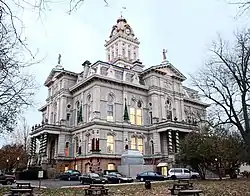 Licking County Courthouse | |
 Flag 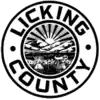 Seal | |
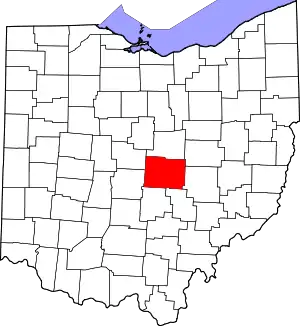 Location within the U.S. state of Ohio | |
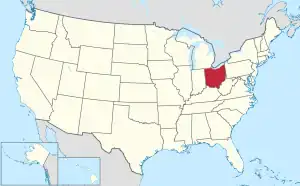 Ohio's location within the U.S. | |
| Coordinates: 40°05′N 82°29′W | |
| Country | |
| State | |
| Founded | March 1, 1808[1] |
| Seat | Newark |
| Largest city | Newark |
| Area | |
| • Total | 687 sq mi (1,780 km2) |
| • Land | 683 sq mi (1,770 km2) |
| • Water | 5.0 sq mi (13 km2) 0.7% |
| Population (2020) | |
| • Total | 178,519 |
| • Estimate (2021) | 180,401 |
| • Density | 260/sq mi (100/km2) |
| Time zone | UTC−5 (Eastern) |
| • Summer (DST) | UTC−4 (EDT) |
| Congressional district | 12th |
| Website | www |
It is named after the Licking River, which is thought to be named for the salt licks that were in the area.[4] However, one account explains it as an English pronunciation of the river's indigenous Delaware name W'li/'ik'/nk, which means "where the flood waters recede".[5]
Licking County is part of the Columbus, OH Metropolitan Statistical Area.
Geography
According to the United States Census Bureau, the county has a total area of 687 square miles (1,780 km2), of which 683 square miles (1,770 km2) is land and 5.0 square miles (13 km2) (0.7%) is water.[6] It is the third-largest county in Ohio by land area.
Adjacent counties
- Knox County (north)
- Coshocton County (northeast)
- Muskingum County (east)
- Perry County (southeast)
- Fairfield County (southwest)
- Franklin County (west)
- Delaware County (northwest)
Demographics
| Census | Pop. | Note | %± |
|---|---|---|---|
| 1810 | 3,852 | — | |
| 1820 | 11,861 | 207.9% | |
| 1830 | 20,869 | 75.9% | |
| 1840 | 35,096 | 68.2% | |
| 1850 | 38,846 | 10.7% | |
| 1860 | 37,011 | −4.7% | |
| 1870 | 35,756 | −3.4% | |
| 1880 | 40,450 | 13.1% | |
| 1890 | 43,279 | 7.0% | |
| 1900 | 47,070 | 8.8% | |
| 1910 | 55,590 | 18.1% | |
| 1920 | 56,426 | 1.5% | |
| 1930 | 59,962 | 6.3% | |
| 1940 | 62,279 | 3.9% | |
| 1950 | 70,645 | 13.4% | |
| 1960 | 90,242 | 27.7% | |
| 1970 | 107,799 | 19.5% | |
| 1980 | 120,981 | 12.2% | |
| 1990 | 128,300 | 6.0% | |
| 2000 | 145,491 | 13.4% | |
| 2010 | 166,492 | 14.4% | |
| 2020 | 178,519 | 7.2% | |
| 2021 (est.) | 180,401 | [7] | 1.1% |
| U.S. Decennial Census[8] 1790-1960[9] 1900-1990[10] 1990-2000[11] 2010-2020[2] | |||
2000 census
As of the census of 2000, there were 146,491 people, 55,609 households, and 40,149 families living in the county. The population density was 212 inhabitants per square mile (82/km2). There were 58,760 housing units at an average density of 86 units per square mile (33 units/km2). The racial makeup of the county was 95.64% White, 2.06% Black or African American, 0.30% Native American, 0.58% Asian, 0.02% Pacific Islander, 0.30% from other races, and 1.10% from two or more races. 0.76% of the population were Hispanic or Latino of any race.[12] Of the 55,609 households 34.40% had children under the age of 18 living with them, 58.50% were married couples living together, 10.00% had a female householder with no husband present, and 27.80% were non-families. 23.10% of households were one person and 9.10% were one person aged 65 or older. The average household size was 2.56 and the average family size was 3.01.
The age distribution was 26.00% under the age of 18, 8.80% from 18 to 24, 29.40% from 25 to 44, 23.90% from 45 to 64, and 11.90% 65 or older. The median age was 37 years. For every 100 females there were 94.80 males. For every 100 females age 18 and over, there were 92.00 males.
The median household income was $44,124 and the median family income was $51,969. Males had a median income of $37,957 versus $26,884 for females. The per capita income for the county was $20,581. About 5.50% of families and 7.50% of the population were below the poverty line, including 9.10% of those under age 18 and 7.50% of those age 65 or over.
2010 census
As of the census of 2010, there were 166,492 people, 63,989 households, and 45,162 families living in the county.[13] The population density was 243.9 inhabitants per square mile (94.2/km2). There were 69,291 housing units at an average density of 101.5 units per square mile (39.2 units/km2).[14] The racial makeup of the county was 93.2% white, 3.4% black or African American, 0.7% Asian, 0.3% American Indian, 0.4% from other races, and 1.9% from two or more races. Those of Hispanic or Latino origin made up 1.4% of the population.[13] In terms of ancestry, 29.5% were German, 16.0% were Irish, 13.0% were English, 10.8% were American, and 5.5% were Italian.[15]
Of the 63,989 households, 34.2% had children under the age of 18 living with them, 54.5% were married couples living together, 11.2% had a female householder with no husband present, 29.4% were non-families, and 23.8% of households were made up of individuals. The average household size was 2.55 and the average family size was 3.00. The median age was 39.1 years.[13]
The median household income was $53,291 and the median family income was $64,386. Males had a median income of $47,391 versus $37,054 for females. The per capita income for the county was $25,534. About 8.2% of families and 11.1% of the population were below the poverty line, including 15.7% of those under age 18 and 6.5% of those age 65 or over.[16]
Politics
Prior to 1944, Licking County primarily supported Democratic Party candidates in presidential elections, only voting for Republican candidates five times from 1856 to 1940 in five national landslides for the party. From 1944 onward, the county has become a Republican stronghold presidentially, with the only Democratic presidential candidate to win the county since then being Lyndon B. Johnson in the midst of his 1964 national landslide.
| Year | Republican | Democratic | Third party | |||
|---|---|---|---|---|---|---|
| No. | % | No. | % | No. | % | |
| 2020 | 59,514 | 63.05% | 33,055 | 35.02% | 1,827 | 1.94% |
| 2016 | 51,241 | 61.28% | 27,376 | 32.74% | 5,007 | 5.99% |
| 2012 | 45,503 | 55.80% | 34,201 | 41.94% | 1,846 | 2.26% |
| 2008 | 46,918 | 56.82% | 33,932 | 41.09% | 1,720 | 2.08% |
| 2004 | 49,016 | 61.72% | 30,053 | 37.84% | 351 | 0.44% |
| 2000 | 37,180 | 59.52% | 23,196 | 37.13% | 2,090 | 3.35% |
| 1996 | 28,276 | 48.78% | 22,624 | 39.03% | 7,067 | 12.19% |
| 1992 | 26,918 | 44.54% | 18,898 | 31.27% | 14,618 | 24.19% |
| 1988 | 34,540 | 66.72% | 16,793 | 32.44% | 434 | 0.84% |
| 1984 | 37,560 | 72.26% | 13,995 | 26.93% | 421 | 0.81% |
| 1980 | 28,425 | 58.28% | 17,208 | 35.28% | 3,136 | 6.43% |
| 1976 | 23,518 | 53.78% | 19,247 | 44.01% | 968 | 2.21% |
| 1972 | 28,070 | 66.47% | 12,460 | 29.50% | 1,702 | 4.03% |
| 1968 | 19,542 | 48.89% | 15,021 | 37.58% | 5,407 | 13.53% |
| 1964 | 15,096 | 39.25% | 23,364 | 60.75% | 0 | 0.00% |
| 1960 | 23,653 | 63.95% | 13,335 | 36.05% | 0 | 0.00% |
| 1956 | 21,912 | 67.44% | 10,581 | 32.56% | 0 | 0.00% |
| 1952 | 20,385 | 63.50% | 11,718 | 36.50% | 0 | 0.00% |
| 1948 | 15,164 | 54.62% | 12,511 | 45.07% | 87 | 0.31% |
| 1944 | 16,815 | 56.74% | 12,819 | 43.26% | 0 | 0.00% |
| 1940 | 16,288 | 49.86% | 16,379 | 50.14% | 0 | 0.00% |
| 1936 | 11,958 | 39.37% | 17,785 | 58.56% | 629 | 2.07% |
| 1932 | 13,355 | 48.01% | 13,904 | 49.99% | 556 | 2.00% |
| 1928 | 19,130 | 72.14% | 7,244 | 27.32% | 143 | 0.54% |
| 1924 | 13,914 | 58.49% | 7,428 | 31.23% | 2,446 | 10.28% |
| 1920 | 11,924 | 51.89% | 10,679 | 46.47% | 378 | 1.64% |
| 1916 | 5,935 | 40.93% | 8,183 | 56.43% | 382 | 2.63% |
| 1912 | 4,487 | 33.73% | 6,120 | 46.01% | 2,694 | 20.25% |
| 1908 | 6,756 | 44.55% | 7,685 | 50.67% | 725 | 4.78% |
| 1904 | 6,798 | 51.04% | 6,019 | 45.19% | 503 | 3.78% |
| 1900 | 5,854 | 46.09% | 6,716 | 52.88% | 130 | 1.02% |
| 1896 | 5,560 | 45.32% | 6,611 | 53.89% | 96 | 0.78% |
| 1892 | 4,619 | 41.97% | 6,038 | 54.87% | 348 | 3.16% |
| 1888 | 4,867 | 43.04% | 6,199 | 54.82% | 241 | 2.13% |
| 1884 | 4,599 | 42.97% | 5,958 | 55.67% | 145 | 1.35% |
| 1880 | 4,210 | 42.62% | 5,575 | 56.44% | 93 | 0.94% |
| 1876 | 3,962 | 41.84% | 5,473 | 57.79% | 35 | 0.37% |
| 1872 | 3,493 | 43.01% | 4,562 | 56.17% | 67 | 0.82% |
| 1868 | 3,487 | 44.03% | 4,432 | 55.97% | 0 | 0.00% |
| 1864 | 3,312 | 46.22% | 3,853 | 53.78% | 0 | 0.00% |
| 1860 | 3,502 | 47.06% | 3,154 | 42.38% | 786 | 10.56% |
| 1856 | 3,027 | 44.42% | 3,371 | 49.46% | 417 | 6.12% |
Industry and business
In January 2022 Intel announced their intention to build a $20 billion semiconductor plant in Licking County that would employ up to 3,000 workers. The facility will be built on 3,190 acres site that have been annexed from Jersey township to New Albany.[18]
Places of interest

- Newark Earthworks
- Blackhand Gorge State Nature Preserve
- Flint Ridge State Memorial
- Dawes Arboretum
- Ye Olde Mill in Utica, where Velvet ice cream is produced.[19]
- Heisey Glass Museum[20]
- Longaberger former basket facility (Main office building was a 7-story replica basket, the largest in the world)
- National Trail Raceway - NHRA Dragstrip[21]
- Denison University
- Home Building Association Bank
Sports
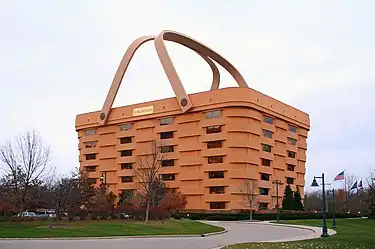
Licking County high school athletic programs include Granville High School, Heath High School, Johnstown-Monroe High School, Lakewood High School, Licking Valley High School, Licking Heights High School, Newark Catholic High School, Newark High School, Northridge High School, Utica High School, and Watkins Memorial High School. In baseball, a state title has been won by a Licking County high school team every year since to 2002, when three Licking County teams won state titles. Newark Catholic High School and Heath High School have combined for nine state titles in a six-year span.
Licking County schools won at least one state title in four straight sport seasons: Heath in both baseball and boys track and field (2007), Newark Catholic in football (2007), Newark in boys basketball (2008) and Lakewood in softball (2008).
Communities

Cities
- Heath
- New Albany
- Newark (county seat)
- Pataskala
- Reynoldsburg
- Johnstown
Villages
Townships
Census-designated places
References
- "Ohio County Profiles: Licking County" (PDF). Ohio Department of Development. Archived from the original (PDF) on June 21, 2007. Retrieved April 28, 2007.
- "State & County QuickFacts". United States Census Bureau. Retrieved October 21, 2022.
- "Find a County". National Association of Counties. Archived from the original on May 31, 2011. Retrieved June 7, 2011.
- Gannett, Henry (1905). The Origin of Certain Place Names in the United States. U.S. Government Printing Office. p. 186.
- Mahr, August C. (April 1957). "Indian River and Place Names in Ohio". Ohio Archaeological and Historical Quarterly. 66 (2): 146–148.
- "2010 Census Gazetteer Files". United States Census Bureau. August 22, 2012. Archived from the original on May 4, 2014. Retrieved February 8, 2015.
- "Annual Estimates of the Resident Population for Counties: April 1, 2020 to July 1, 2021". Retrieved October 21, 2022.
- "U.S. Decennial Census". United States Census Bureau. Retrieved February 8, 2015.
- "Historical Census Browser". University of Virginia Library. Retrieved February 8, 2015.
- Forstall, Richard L., ed. (March 27, 1995). "Population of Counties by Decennial Census: 1900 to 1990". United States Census Bureau. Retrieved February 8, 2015.
- "Census 2000 PHC-T-4. Ranking Tables for Counties: 1990 and 2000" (PDF). United States Census Bureau. April 2, 2001. Archived (PDF) from the original on March 27, 2010. Retrieved February 8, 2015.
- "U.S. Census website". United States Census Bureau. Retrieved January 31, 2008.
- "DP-1 Profile of General Population and Housing Characteristics: 2010 Demographic Profile Data". United States Census Bureau. Archived from the original on February 13, 2020. Retrieved December 27, 2015.
- "Population, Housing Units, Area, and Density: 2010 - County". United States Census Bureau. Archived from the original on February 13, 2020. Retrieved December 27, 2015.
- "DP02 SELECTED SOCIAL CHARACTERISTICS IN THE UNITED STATES – 2006-2010 American Community Survey 5-Year Estimates". United States Census Bureau. Archived from the original on February 13, 2020. Retrieved December 27, 2015.
- "DP03 SELECTED ECONOMIC CHARACTERISTICS – 2006-2010 American Community Survey 5-Year Estimates". United States Census Bureau. Archived from the original on February 13, 2020. Retrieved December 27, 2015.
- Leip, David. "Dave Leip's Atlas of U.S. Presidential Elections". uselectionatlas.org. Retrieved May 2, 2018.
- Williams, Mark; Trombly, Monroe (January 14, 2022). "What we know about Intel factory coming to Columbus area". The Columbus Dispatch.
- "The Velvet Ice Cream Company in Utica, Ohio". Archived from the original on June 1, 2007. Retrieved January 11, 2019.
- "Heisey Collectors of America". Heiseymuseum.org. Retrieved January 11, 2019.
- "National Trail Raceway". Retrieved January 11, 2019.
- Ohio Townships
Further reading
- Thomas William Lewis, History of Southeastern Ohio and the Muskingum Valley, 1788-1928. In Three Volumes. Chicago: S.J. Clarke Publishing Co., 1928.